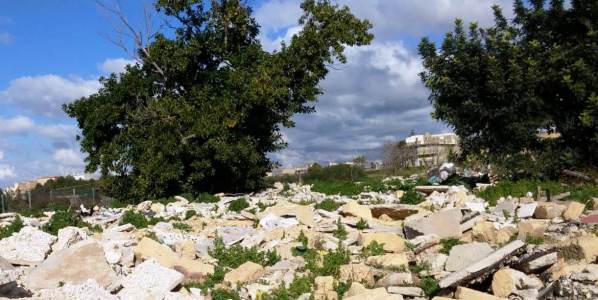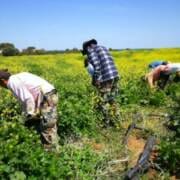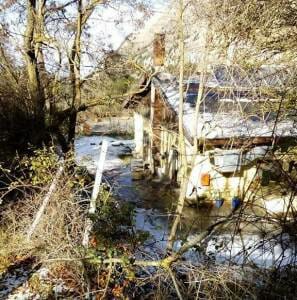Return to Hell
“It’s
the first time I’ve come to this hell hole. I live in Brescia, where
I was working along with my father, but since the crisis we haven’t
been able to survive. We lost our street vendors’ permit and my
father got ill. We live in a slum, and I’ve been
going
round Italy working on the land. Some of my friends told me to come
to Campobello for the olive harvest and earn some money, but instead
I’ve found myself sleeping in this place, finding it difficult to eat
because I’ve got no money, and what’s more I have to work the whole
day to earn just €20, because they work you to the bone down here.”

These are the words of ‘A’, 27 years old, who is one of the 1,400
people who have populated – and are still present in – the fields
of Campobello di Mazara. We went back ten days ago to see how the
situation at the “Ciao Ousmane” camp has fared. In comparison
with last year, the mood was much worse. One year has been enough to
improve the conditions of the place, that is, to provide dignified
conditions to those who work for us, who take care of our trees and
who, with so much dignity, attempt to put together some money to
live.
“I’ve
arrived in hell – actually, I’ve returned to it, because I’m
reliving the same situations which I experienced in the camps in
Africa which I passed through before I came to Italy. I had promised
myself that I would rather die than live in the filth, the
degradation, just smell the stench…”

‘I.’, 22 years old, from Sudan, confirms for us that the camp is much
more dirty than last year, and more or less in a situation of
abandonment. It is unthinkable that two people alone (the workers of
the cooperative that have the task of assisting the migrants with
their needs) can run a camp of 1,400 people. This year there have
been more people in the context of a poorer harvest, which has
created specific problems.
One main difficulty that we have been able to witness derives from
the institutional agents who, despite having received the funds, have
not managed to attain any improvement in the services provided by the
camp. Indeed, the camp was opened late, in relation to the beginning
of the olive harvest, because – according to the account of some
activists – over the intervening period it had been used as a waste
dump. And where did the money go? A question which finds no easy
response, given that the very same institutions, on our request to
meet with them, dug themselves in behind a “no comment.”

That money should have been used to repair the water boiler, to set
up more showers and toilets (there are only 12), to make some gutters
to unblock the surplus water. None of this was done. Some of the
migrants, instead of working at the harvest, stay in the camp to heat
water and then sell it on at 50 cents a bucket.
“We
are convinced that these people are lower than us, and can take
anything, this is the only way we can make them live like this”,
denounces one of the activists at the camp. He complains not only
about the total abandonment by institutional agents, but also by
associations which, having signed a protocol of understanding,
disappeared into thin air.
While walking among the tents, we could feel the failure not only of
the local institutions, but also our society. Our eyes cross with
people who are tired of bearing the signs of exhaustion, or with
those who, despite the great difficulties they face, show a desire to
keep on fighting, who want to go further because who cannot stop and
wait for a life with opportunities.

“It’s
like an African slum” declares another activist who accompanied our
visit to the camp. This year the work has been less, and many people
have remained in the camp, including those who play draughts made
from cardboard and bottle tops.
“I
came from Florence. I paid a ticket to work, but I can’t take only €2
for a box, I want at least €4.50, my dignity isn’t for sale…”.
“I haven’t worked, there’s so little work and now I’m stuck here
because I don’t even have the money to turn back”, R and S tell us,
both Moroccan.
Those who came back after last year wanted better wages than the
past, while those who are new, or without leave to remain, will do
anything just to have €10 in their pocket, to the happiness of the
owners of the olive groves. This is a war among the poor, a “blessed”
war which the landlords want, a race to the bottom, played out for
those who want to pay the least. It is a vicious circle of
exploitation. On one side there is the state which creates invisible
people, rejecting them, or revoking their right to the reception
system, or handing out a flurry of negatives at the Commission –
and on the other side there are the citizens who, harassed by large
multinationals which impose famine prices, have to hand the prices
down to the last rung – really the very last, because it remains
invisible.

All of this has serious consequences on people, creating fear, unease
and inhumanity. These are stories of the “unlife” on our streets,
which we pretend not to see. And we are building walls to make sure
we don’t have to enter into any kind of contact.
Yet again we ask ourselves: where are the institutions, whether civil
or religious? Those which could create points of meeting and
dialogue, which could create some kind of preventative work of
interaction, who are all so obvious due to their absence. Perhaps
their only objective is to allow for a labour force without rights
and at low cost.
And they’ve managed it this year yet again. The olives have been
harvested and the people have begun to leave the camp. Some go back
to their families, others will be exploited again in some other work
camp for another harvest.
For those who remain, like those friends who we met in the abandoned
farm houses, survival will not be enough. Among this group of 40-50
people there are some minors who have run away from some reception
hostel on the island. Their experience of abandonment is given some
support by their older brothers, the only form of guidance remaining
to stop them from sinking into the inferno.
N.B.:
at the time of writing, 30 November 2016, there are around 80 workers
still remaining at the camp, even though it has officially closed. On
December 1st
it will be reassigned to the local council. This is what remains of
the 1,400 slaves:



Alberto Biondo
Borderline Sicilia
Project
“OpenEurope” – Oxfam Italia, Diaconia Valdese, Borderline
Sicilia Onlus
Translation
by Richard Braude



